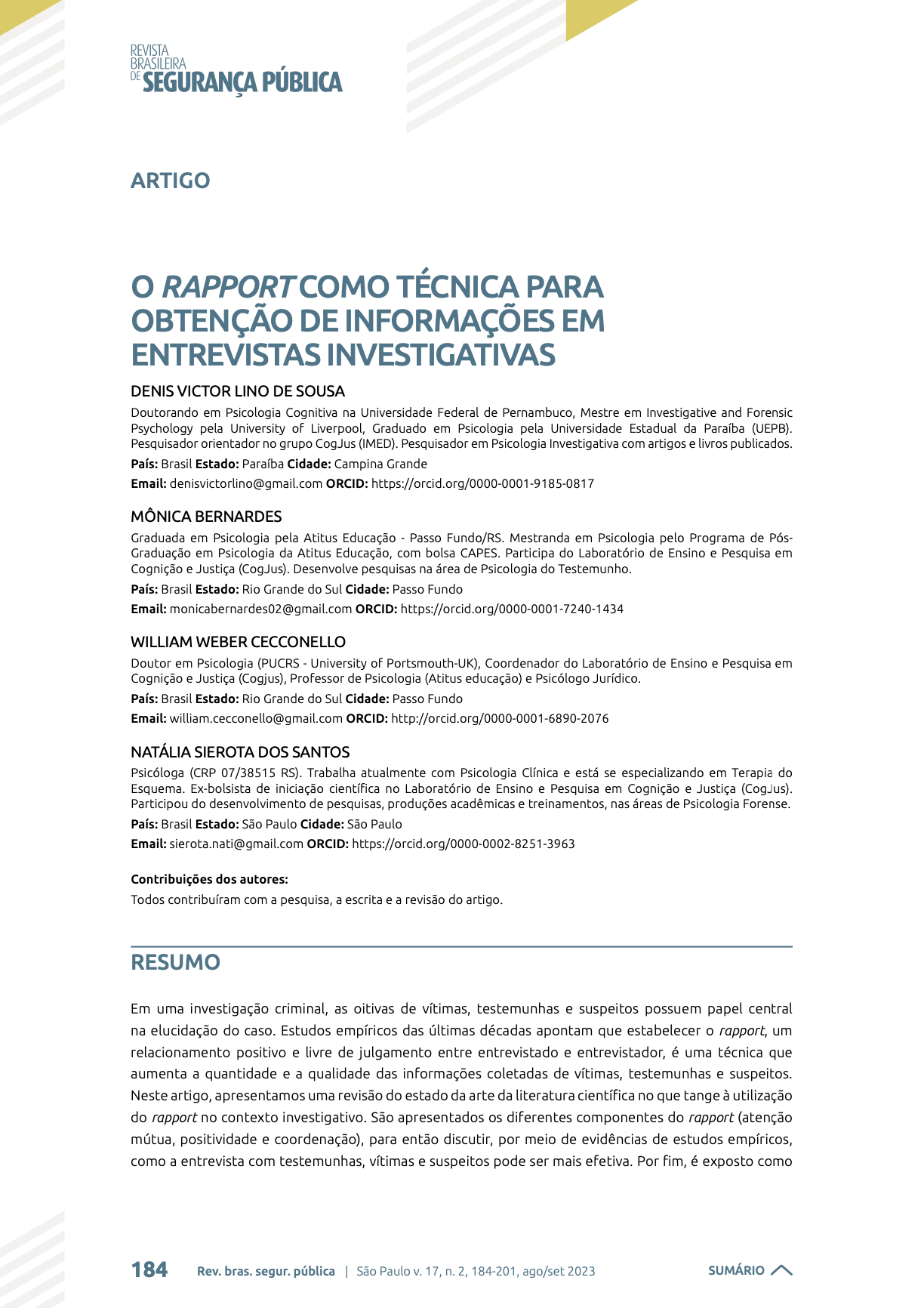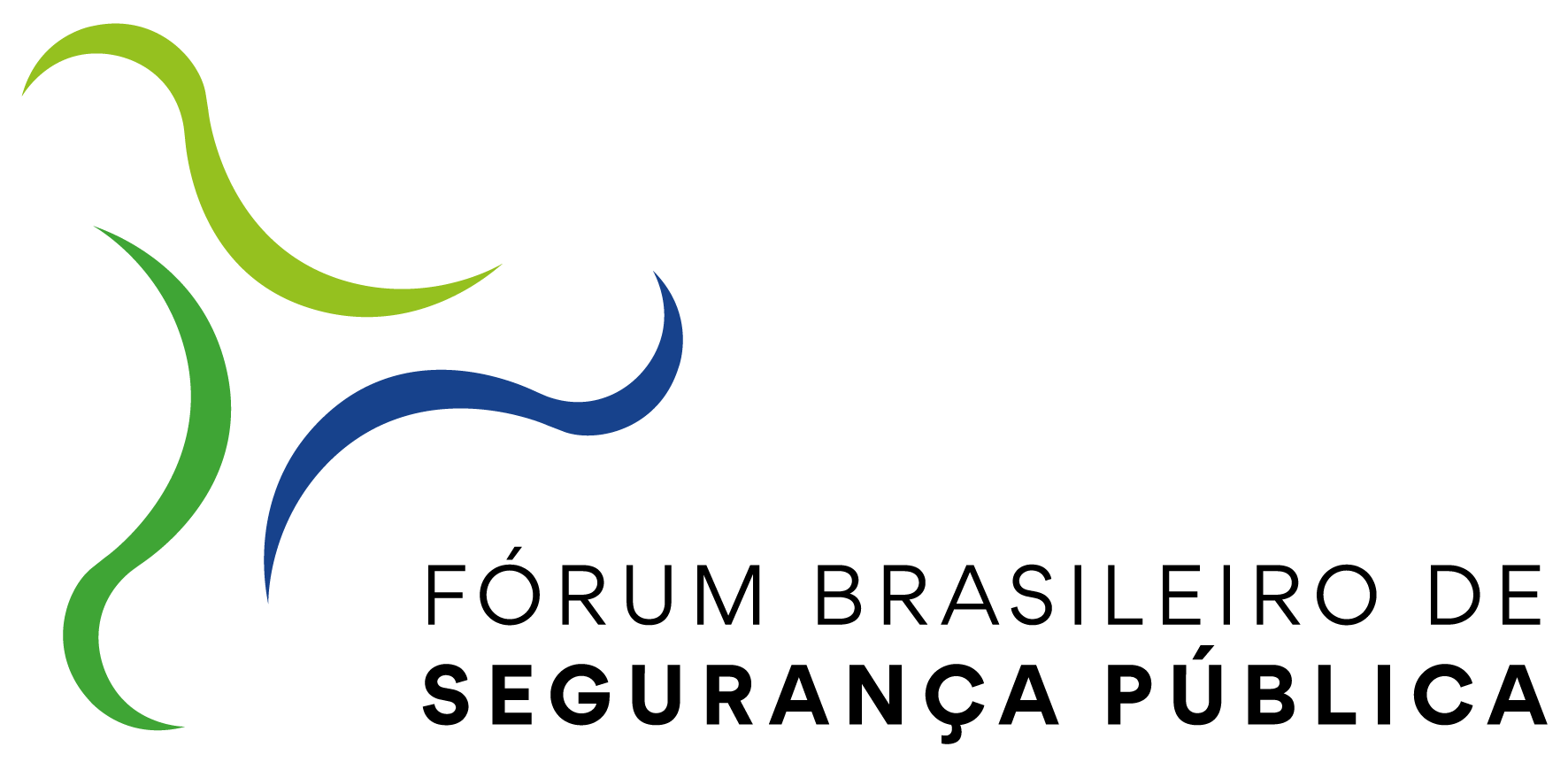El Rapport como técnica para obtener información en las entrevistas de investigación
DOI:
https://doi.org/10.31060/rbsp.2023.v17.n2.1584Palabras clave:
Entrevista, Policía Judicial, Psicología forense, RapportResumen
En una investigación criminal, las entrevistas a víctimas, testigos y sospechosos desempeñan un papel fundamental en la búsqueda del autor del delito. El establecimiento del rapport, una relación positiva y libre de juicios entre entrevistado y entrevistador, es una de las técnicas de eficacia comprobada para mejorar la cantidad y la calidad de la información recogida. Sin embargo, no existen estudios en portugués brasileño sobre el tema o que evidencien el uso del rapport en el contexto investigativo, laguna que este artículo pretende llenar utilizando una revisión narrativa. Se presenta la definición de rapport y cómo puede establecerse, seguido de las principales evidencias y ventajas del uso de esta técnica en entrevistas de investigación con testigos, víctimas y sospechosos. Por último, se explica cómo se utiliza el rapport en los principales protocolos internacionales de entrevistas de investigación, así como las recomendaciones para aplicarlo en la práctica policial brasileña.
Descargas
Citas
ABBE, A.; BRANDON, S. E. The Role of Rapport in Investigative Interviewing: A Review. Journal of Investigative Psychology and Offender Profiling, v. 10, n. 3, p. 237-249, 2013.
ABREU, D. P. Práticas de entrevista investigativa com suspeitos no contexto brasileiro. Dissertação (Mestrado em Psicologia) – Escola de Ciências da Saúde e da Vida, Pontifícia Universidade Católica do Rio Grande do Sul, 2019. 51p.
AGÊNCIA DA ONU PARA REFUGIADOS. Manual de procedimentos e critérios para a determinação da condição de refugiado. ANHCR/ACNUR, [s.d.].
ALISON, L.; ALISON, E. Revenge versus rapport: Interrogation, terrorism, and torture. American Psychological, v. 72, n. 3, p. 266-277, 2017.
ALISON, L. J.; ALISON, E.; NOONE, G.; ELNTIB, S. Why tough tactics fail, and rapport gets results: Observing rapport-based interpersonal techniques (ORBIT) to generate useful information from terrorists. Psychology, Public Policy and Law, v. 19, n. 4, p. 411-431, 2013.
ALISON, L.; ALISON, E. K.; NOONE, G.; ELNTIB, S.; WARING, S.; CHRISTIANSEN, P. The efficacy of rapport-based techniques for minimizing counter-interrogation tactics amongst a field sample of terrorists. Psychology, Public Policy and Law, v. 20, n. 4, p. 421-430, 2014.
ALISON, L. J.; ALISON, E.; SHORTLAND, N.; SURMON-BOHR, F. ORBIT: The Science of Rapport-Based Interviewing for Law Enforcement, Security, and Military. New York/NY: Oxford University Press, 2021.
BAKER-ECK, B.; BULL, R.; WALSH, D. Investigative empathy: Five types of cognitive empathy in a field study of investigative interviews with suspects of sexual offenses. Investigative Interviewing: Research and Practice, v. 11, n. 1, p. 30-39, 2021.
BEDI, R. P.; DAVIS, M. D.; WILLIAMS, M. Critical incidents in the formation of the therapeutic alliance from the client’s perspective. Psychotherapy: Theory, Research, Practice, Training, v. 42, n. 3, p. 311-323, 2005.
CHILDHOOD BRASIL (INSTITUTO WCF/BRASIL); CONSELHO NACIONAL DE JUSTIÇA – CNJ; FUNDO DAS NAÇÕES UNIDAS PARA A INFÂNCIA – UNICEF. Protocolo brasileiro de entrevista forense com crianças e adolescentes vítimas ou testemunhas de violência. São Paulo; Brasília: Childhood – Instituto WCF/Brasil; CNJ; UNICEF, 2020. 74p.
COAN, G. Jr. Rapport: Definition and Dimensions. In: KINNEAR, T. C. (ed.). NA - Advances in Consumer Research Volume 11. Provo, UT: Association for Consumer Research, p. 333-336, 1984.
COLLINS, K.; CARTHY, N. No rapport, no comment: The relationship between rapport and communication during investigative interviews with suspects. Journal of Investigative Psychology and Offender Profiling, v. 16, n. 1, p. 18-31, 2019.
COLLINS, N. L.; MILLER, L. C. Self-disclosure and liking: A meta-analytic review. Psychological Bulletin, v. 116, n. 3, p. 457-475, 1994.
COLLINS, R.; LINCOLN, R.; FRANK, M. G. The effect of Rapport in Forensic Interviewing. Psychiatry, Psychology and Law, v. 9, n. 1, p. 69-78, 2002.
DEFFENBACHER, K. A.; BORNSTEIN, B. H.; PENROD, S. D.; MCGORTY, E. K. A meta-analytic review of the effects of high stress on eyewitness memory. Law and Human Behavior, v. 28, n. 6, p. 687-706, 2004.
DEL PRETTE, A.; DEL PRETTE, Z. A. P. Competência social e habilidades sociais: Manual teórico-prático. Porto Alegre: Vozes, 2017.
DERAKSHAN, N.; EYSENCK, M. W. Anxiety, processing efficiency, and cognitive performance: new developments from attentional control theory. European Psychologist, v. 14, n. 2, p. 168-176, 2009.
EYSENCK, M. W.; DERAKSHAN, N.; SANTOS, R.; CALVO, M. G. Anxiety and cognitive performance: Attentional control theory. Emotion, v. 7, n. 2, p. 336-353, 2007.
FAWCETT, J. M.; RUSSELL, E. J.; PEACE, K. A.; CHRISTIE, J. Of guns and geese: a meta-analytic review of the “weapon focus” literature. Psychology, Crime & Law, v. 19, n. 1, p. 35–66, 2013.
GABBERT, F.; HOPE, L.; LUTHER, K.; WRIGHT, G.; NG, N. M.; OXBURGH, G. Exploring the Use of Rapport in Professional Information‐ Gathering Contexts by Systematically Mapping the Evidence Base. Applied Cognitive Psychology, v. 35, n. 2, p. 329-341, 2021.
GOODMAN-DELAHUNTY, J.; MARTSCHUK, N.; DHAMI, M. K. Interviewing high value detainees: Securing cooperation and disclosures. Applied Cognitive Psychology, v. 28, n. 6, p. 883-897, 2014.
HIGH-VALUE DETAINEE INTERROGATION GROUP – HIG. Interrogation: A review of the Science. [s.l.], 2016.
HOLMBERG, U.; CHRISTIANSON, S. Murderers’ and sexual offenders’ experiences of police interviews and their inclination to admit or deny crimes. Behavioral Sciences & The Law, v. 20, n. 1‐2, p. 31-45, 2002.
HORVATH, A. O.; DEL RE, A. C.; FLÜCKIGER, C.; SYMONDS, D. Alliance in individual psychotherapy. Psychotherapy, v. 48, n. 1, p. 9-16, 2011.
INBAU, F. E.; REID, J. E.; BUCKLEY, J. P.; JAYNE, B. C. Essentials of the Reid Technique: criminal interrogation and confessions. 2 ed. Burlington/MA: Jones & Bartlett Learning, 2013.
KASSIN, S. M.; DRIZIN, S. A.; GRISSO, T.; GUDJONSSON, G. H.; LEO, R. A.; REDLICH, A. D. Police-induced confessions: risk factors and recommendations. Law and Human Behavior, v. 34, p. 3-38, 2010.
KIECKHAEFER, J. M.; VALLANO, J. P.; COMPO, N. S. Examining the positive effects of rapport building: when and why does rapport building benefit adult eyewitness memory?. Memory, v. 22, n. 8, p. 1010-1023, 2014.
KRAMER, T. H.; BUCKHOUT, R.; EUGENIO, P. Weapon focus, arousal, and eyewitness memory: attention must be paid. Law and Human Behavior, v. 14, n. 2, p. 167-184, 1990.
LEACH, M. J. Rapport: a key to treatment success. Complementary Therapies in Clinical Practice, v. 11, n. 4, p. 262-265, 2005.
LEAHY-HARLAND, S.; BULL, R. Police strategies and suspect responses in real-life serious crime interviews. Journal of Police and Criminal Psychology, v. 32, n. 2, p. 138-151, 2017.
MELO, H. B. Information-gathering interrogation methods: possible applications for counterterrorism in the African Continent. African Journal on Terrorism, v. 9, n. 1, p. 205-219, 2020.
MINISTÉRIO DA JUSTIÇA – MJ; INSTITUTO DE PESQUISA ECONÔMICA APLICADA – IPEA. Avanços científicos em psicologia do testemunho aplicados ao reconhecimento pessoal e aos depoimentos forenses. Série Pensando o Direito, n. 59. Brasília: Ministério da Justiça, Secretaria de Assuntos Legislativos (SAL); IPEA, 2015.
MOSCATELLI, L. Y. N. Considerações sobre a confissão e o método Reid aplicado na investigação criminal. Revista Brasileira de Direito Processual Penal, v. 6, n. 1, p. 361-394, 2020.
NUNAN, J.; STANIER, I.; MILNE, R.; SHAWYER, A.; WALSH, D. Eliciting human intelligence: police source handlers’ perceptions and experiences of rapport during covert human intelligence sources (CHIS) interactions. Psychiatry, Psychology and Law, v. 27, n. 4, p. 1-27, 2020.
O’MARA, S. Why torture doesn’t work: The Neuroscience of Interrogation. Cambridge/MA: Harvard University Press, 2015.
OXBURGH, L.; GABBERT, F.; MILNE, R.; CHERRYMAN, J. Police officers’ perceptions and experiences with mentally disordered suspects. International Journal of Law and Psychiatry, v. 49, p. 138-146, 2016.
PAULO, R. M.; ALBUQUERQUE, P. B.; BULL, R. A Entrevista Cognitiva Melhorada: Pressupostos teóricos, investigação e aplicação. PSICOLOGIA, v. 28, n. 2, p. 21–30, 2014
PRESCOTT, K.; MILNE, R.; CLARKE, J. How effective is the enhanced cognitive interview when aiding recall retrieval of older adults including memory for conversation?. Journal of Investigative Psychology and Offender Profiling, v. 8, n. 3, p. 257-270, 2011.
RISAN, P.; BINDER, P. E.; MILNE, B. Establishing and maintaining rapport in investigative interviews of traumatized victims: a qualitative study. Policing: A Journal of Policy and Practice, v. 12, n. 4, p. 372-387, 2018.
SPENCER-OATEY, H. Face, (Im)politeness and Rapport. In: SPENCER-OATEY, H. (ed.). Culturally Speaking: Culture, Communication and Politeness Theory. Londres: Continuum, p. 11-47, 2008.
TICKLE-DEGNEN, L.; ROSENTHAL, R. The nature of rapport and its nonverbal correlates. Psychological Inquiry, v. 1, n. 4, p. 285-293, 1990.
TULVING, E. What is episodic memory?. Current Directions in Psychological Science, v. 2, n. 3, p. 67-70, 1993.
VALLANO, J. P.; COMPO, N. S. A comfortable witness is a good witness: rapport-building and susceptibility to misinformation in an investigative mock-crime interview. Applied Cognitive Psychology, v. 25, n. 6, p. 960-970, 2011.
VALLANO, J. P.; COMPO, N. S. Rapport building with cooperative witnesses and criminal suspects: a theoretical and empirical review. Psychology, Public Policy and Law, v. 21, n. 1, p. 85-99, 2015.
VALLANO, J. P.; EVANS, J. R.; KIECKHAEFER, J. M.; COMPO, N. S. Rapport-building during witness and suspect interviews: a survey of law enforcement. Applied Cognitive Psychology, v. 29, n. 3, p. 369-380, 2015.
VENETIS, M. K.; GREENE, K.; MAGSAMEN-CONRAD, K.; BANERJEE, S. C.; CHECTON, M. G.; BAGDASAROV, Z. “You can’t tell anyone but ...”: exploring the use of privacy rules and revealing behaviors. Communication Monographs, v. 79, n. 3, p. 344-365, 2012.
WALSH, D.; BULL, R. What really is effective in interviews with suspects? A study comparing interviewing skills against interviewing outcomes. Legal and Criminological Psychology, v. 15, n. 2, p. 305-321, 2010.
WALSH, D.; BULL, R. Examining rapport in investigative interviews with suspects: Does its building and maintenance work?. Journal of Police and Criminal Psychology, v. 27, n. 1, p. 73-84, 2012.
WILLIAMS, L. C. A.; HACKBARTH, C.; BLEFARI, C. A.; PADILHA, M. G. S.; PEIXOTO, C. E. Investigação de suspeita de abuso sexual infantojuvenil: o Protocolo NICHD. Temas em Psicologia, v. 22, n. 2, p. 415-432, 2014.
WOLF, O. T. Stress and memory retrieval: mechanisms and consequences. Current Opinions in Behavioral Sciences, v. 14, p. 40-46, 2017.

Publicado
Cómo citar
Número
Sección
Licencia
Derechos de autor 2023 Revista Brasileira de Segurança Pública

Esta obra está bajo una licencia internacional Creative Commons Atribución 4.0.
Licencia
La Revista Brasileña de Seguridad Pública utiliza la Licencia Creative Commons como forma de licenciamiento para sus trabajos publicados. La licencia utilizada sigue el modelo CC BY 4.0 - Atribución 4.0 Internacional.
Para ver los derechos permitidos por favor vaya a la licencia completa o a nuestra página de Derechos de Autor y Licencias.


